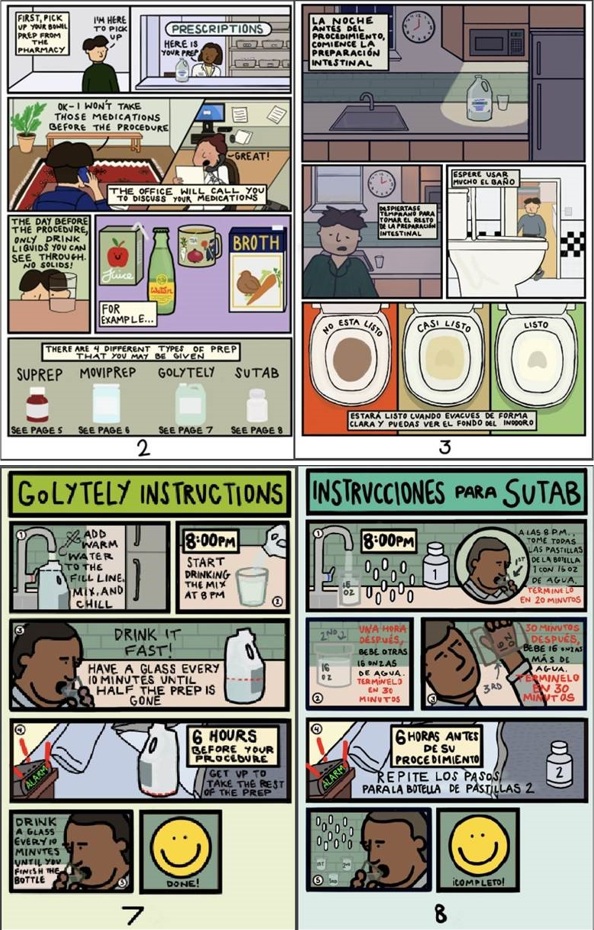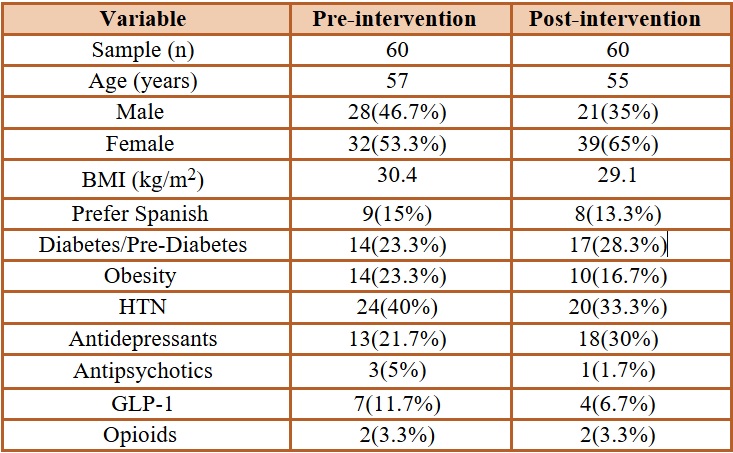Monday Poster Session
Category: Colorectal Cancer Prevention
P2648 - A Picture Is Worth a Thousand Words - Using Cartoons Instead of Text to Improve Colonoscopy Bowel Prep
Monday, October 27, 2025
10:30 AM - 4:00 PM PDT
Location: Exhibit Hall

Mihir Patel, MD
University of Texas at Austin
Manor, TX
Presenting Author(s)
Mihir Patel, MD1, Sara Gottesman, MD2, Barbara Mensah, MD3, Gaurav Gomber, BS3, Charles Hyman, MD4, Kavitha Kumbum, MD3, Linda A. Feagins, MD3, David Tang, MD3, Deepak Agrawal, MD, MPH4
1University of Texas at Austin, Manor, TX; 2University of Texas Austin, Austin, TX; 3University of Texas at Austin Dell Medical School, Austin, TX; 4University of Texas at Austin, Austin, TX
Introduction: Bowel prep adequacy is critical for effective colon cancer screening but up to 25% of patients have inadequate preps. Patients at our institution, as well as most others, typically receive text-based, electronic, or printed instructions for colonoscopy. Studies show that a carefully structured use of images improves comprehension, adherence to medical treatment, and engagement. In this study, we partnered with patients to assess the clarity and limitations of text-based instructions and developed cartoon-based bowel prep instructions, aiming to improve bowel prep quality.
Methods: In the pilot study, 108 patients at an academic hospital-based endoscopy unit from June to July 2024, undergoing colonoscopy prep with the text-based prep instructions, completed a survey on their understanding and clarity of the instructions. About 40% of respondents favored pictorial instructions. Subsequently, we developed a cartoon detailing bowel prep instructions (Fig.1), using feedback from patients, endoscopy nurses, and schedulers. The limited text within cartoons was also translated into Spanish based on patients’ preferences. The cartoon-based instructions, along with concise written instructions, were made available via link, email or paper handout. After 4 months to allow for proper implementation of the new instructions, we conducted a retrospective study to compare the pre- and post-intervention cohorts. The primary outcome was the rate of inadequate prep.
Results: The average age in pre-intervention and post-intervention cohorts was similar, 57 years old and 55 years old, respectively (Table 1). We also assessed common risk factors such as hypertension, diabetes/prediabetes, and obesity, which were similar in both cohorts. Antipsychotic and GLP-1 use was higher in the pre-intervention cohort. Opioid use was low, with 2 patients in each cohort. In the pre-intervention cohort, 6/60(10%) patients had inadequate prep. In the post-intervention cohort, 4/60(6.67%) patients had inadequate prep (p = 0.26).
Discussion: In this study, we designed the first fully cartoon-based bowel prep instructions, incorporating patient and provider preferences. By improving understanding of bowel prep and addressing patients’ needs, we had a relative risk reduction of inadequate prep of 33.3%. A larger sample size and broader implementation in other endoscopy units will help determine if pictorial instructions can complement or replace traditional text-based instructions and improve rates of colon cancer prevention.

Figure: Table 1: Demographics and Descriptive Statistics of Pre-intervention and Post-intervention Cohorts.

Figure: Figure 1: Excerpts from cartoon bowel prep instructions and medication-specific cartoon bowel prep instructions. Top left panel: English instructions page 2. Top right panel: Spanish Instructions page 3. Bottom left panel: English Golytely instructions. Bottom right panel: Spanish SUTAB instructions.
Disclosures:
Mihir Patel indicated no relevant financial relationships.
Sara Gottesman indicated no relevant financial relationships.
Barbara Mensah indicated no relevant financial relationships.
Gaurav Gomber indicated no relevant financial relationships.
Charles Hyman indicated no relevant financial relationships.
Kavitha Kumbum indicated no relevant financial relationships.
Linda Feagins: Corevitas – Clinical trial participation. Takeda – Clinical trial participation.
David Tang indicated no relevant financial relationships.
Deepak Agrawal indicated no relevant financial relationships.
Mihir Patel, MD1, Sara Gottesman, MD2, Barbara Mensah, MD3, Gaurav Gomber, BS3, Charles Hyman, MD4, Kavitha Kumbum, MD3, Linda A. Feagins, MD3, David Tang, MD3, Deepak Agrawal, MD, MPH4. P2648 - A Picture Is Worth a Thousand Words - Using Cartoons Instead of Text to Improve Colonoscopy Bowel Prep, ACG 2025 Annual Scientific Meeting Abstracts. Phoenix, AZ: American College of Gastroenterology.
1University of Texas at Austin, Manor, TX; 2University of Texas Austin, Austin, TX; 3University of Texas at Austin Dell Medical School, Austin, TX; 4University of Texas at Austin, Austin, TX
Introduction: Bowel prep adequacy is critical for effective colon cancer screening but up to 25% of patients have inadequate preps. Patients at our institution, as well as most others, typically receive text-based, electronic, or printed instructions for colonoscopy. Studies show that a carefully structured use of images improves comprehension, adherence to medical treatment, and engagement. In this study, we partnered with patients to assess the clarity and limitations of text-based instructions and developed cartoon-based bowel prep instructions, aiming to improve bowel prep quality.
Methods: In the pilot study, 108 patients at an academic hospital-based endoscopy unit from June to July 2024, undergoing colonoscopy prep with the text-based prep instructions, completed a survey on their understanding and clarity of the instructions. About 40% of respondents favored pictorial instructions. Subsequently, we developed a cartoon detailing bowel prep instructions (Fig.1), using feedback from patients, endoscopy nurses, and schedulers. The limited text within cartoons was also translated into Spanish based on patients’ preferences. The cartoon-based instructions, along with concise written instructions, were made available via link, email or paper handout. After 4 months to allow for proper implementation of the new instructions, we conducted a retrospective study to compare the pre- and post-intervention cohorts. The primary outcome was the rate of inadequate prep.
Results: The average age in pre-intervention and post-intervention cohorts was similar, 57 years old and 55 years old, respectively (Table 1). We also assessed common risk factors such as hypertension, diabetes/prediabetes, and obesity, which were similar in both cohorts. Antipsychotic and GLP-1 use was higher in the pre-intervention cohort. Opioid use was low, with 2 patients in each cohort. In the pre-intervention cohort, 6/60(10%) patients had inadequate prep. In the post-intervention cohort, 4/60(6.67%) patients had inadequate prep (p = 0.26).
Discussion: In this study, we designed the first fully cartoon-based bowel prep instructions, incorporating patient and provider preferences. By improving understanding of bowel prep and addressing patients’ needs, we had a relative risk reduction of inadequate prep of 33.3%. A larger sample size and broader implementation in other endoscopy units will help determine if pictorial instructions can complement or replace traditional text-based instructions and improve rates of colon cancer prevention.

Figure: Table 1: Demographics and Descriptive Statistics of Pre-intervention and Post-intervention Cohorts.

Figure: Figure 1: Excerpts from cartoon bowel prep instructions and medication-specific cartoon bowel prep instructions. Top left panel: English instructions page 2. Top right panel: Spanish Instructions page 3. Bottom left panel: English Golytely instructions. Bottom right panel: Spanish SUTAB instructions.
Disclosures:
Mihir Patel indicated no relevant financial relationships.
Sara Gottesman indicated no relevant financial relationships.
Barbara Mensah indicated no relevant financial relationships.
Gaurav Gomber indicated no relevant financial relationships.
Charles Hyman indicated no relevant financial relationships.
Kavitha Kumbum indicated no relevant financial relationships.
Linda Feagins: Corevitas – Clinical trial participation. Takeda – Clinical trial participation.
David Tang indicated no relevant financial relationships.
Deepak Agrawal indicated no relevant financial relationships.
Mihir Patel, MD1, Sara Gottesman, MD2, Barbara Mensah, MD3, Gaurav Gomber, BS3, Charles Hyman, MD4, Kavitha Kumbum, MD3, Linda A. Feagins, MD3, David Tang, MD3, Deepak Agrawal, MD, MPH4. P2648 - A Picture Is Worth a Thousand Words - Using Cartoons Instead of Text to Improve Colonoscopy Bowel Prep, ACG 2025 Annual Scientific Meeting Abstracts. Phoenix, AZ: American College of Gastroenterology.
